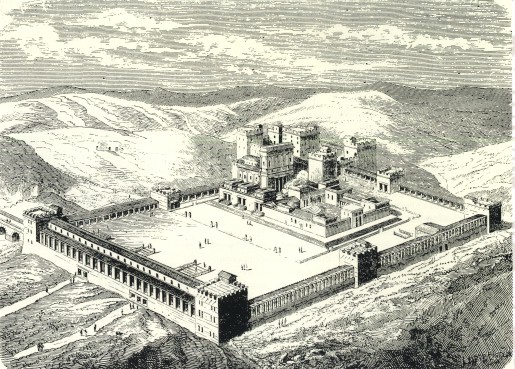3 But that same night the word of the Lord came to Nathan,In this covenant, God promises to establish David's throne forever, which would ultimately be fulfilled in Christ (Lk. 1:32). This covenant, like the others, does not annul God's previous covenants and it reveals more about the covenant of grace. Each of the kings that followed David would be judged according to the Mosaic Covenant (MC), and when the kings and the people broke the MC, judgment came culminating in the exile (cf. 2 Kgs. 17:13ff). Nor does the DC merely rest on the MC, but the DC is still based upon the covenantal refrain. Ezekiel discusses God's covenant with David in terms of the covenantal refrain, "And I, the Lord, will be their God, and my servant David shall be prince among them." (Eze. 34:24) Here, as a covenantal representative, David substitutes for the people of God. He belongs to the Lord; so all the people belong to the Lord. They will be His people and He will be their God. Furthermore, God's promised fellowship with His people finds even greater fulfillment in the glorious, permanent dwelling of the Temple (1 Kgs. 6; 2 Chr. 7). So, like the previous covenants, the DC does not replace the others but supplements and builds upon the previous covenants. It also reveals a little more about the Messiah: He would be an eternal King who sits on the throne of David, which the angel Gabriel told Mary Jesus fulfills:
...
7 "Now, therefore, thus shall you say to my servant David, 'Thus says the Lord of hosts, I took you from the pasture, from following the sheep, to be prince over my people Israel, 8 and I have been with you wherever you have gone and have cut off all your enemies from before you. And I will make for you a name, like the name of the great ones of the earth. 9 And I will appoint a place for my people Israel and will plant them, that they may dwell in their own place and be disturbed no more. And violent men shall waste them no more, as formerly, 10 from the time that I appointed judges over my people Israel. And I will subdue all your enemies. Moreover, I declare to you that the Lord will build you a house. 11 When your days are fulfilled to walk with your fathers, I will raise up your offspring after you, one of your own sons, and I will establish his kingdom. 12 He shall build a house for me, and I will establish his throne forever. 13 I will be to him a father, and he shall be to me a son. I will not take my steadfast love from him, as I took it from him who was before you, 14 but I will confirm him in my house and in my kingdom forever, and his throne shall be established forever.'" (1 Chr. 17:3, 7-14)
26 In the sixth month the angel Gabriel was sent from God to a city of Galilee named Nazareth, 27 to a virgin betrothed to a man whose name was Joseph, of the house of David. And the virgin's name was Mary. 28 And he came to her and said, "Greetings, O favored one, the Lord is with you!" 29 But she was greatly troubled at the saying, and tried to discern what sort of greeting this might be. 30 And the angel said to her, "Do not be afraid, Mary, for you have found favor with God. 31 And behold, you will conceive in your womb and bear a son, and you shall call his name Jesus. 32 He will be great and will be called the Son of the Most High. And the Lord God will give to him the throne of his father David, 33 and he will reign over the house of Jacob forever, and of his kingdom there will be no end." (Lk. 1:26-33)It is Jesus' kingship that makes our salvation possible, Paul tells us in Colossians, "13 He has delivered us from the domain of darkness and transferred us to the kingdom of his beloved Son, 14 in whom we have redemption, the forgiveness of sins." (Col. 1:13-14) Jesus is King—King of this universe and King of believer's lives—which means He sit on an eternal throne in an eternal kingdom, of which believers are now citizens and will be forever (Eph. 2:19).
On this day of Advent, remember that you might be a citizen of America or another earthly country, but if you belong to Jesus, you are first and foremost a citizen of His Kingdom, in which there is salvation and of which there will be no end!
By His Grace,
Taylor

No comments:
Post a Comment